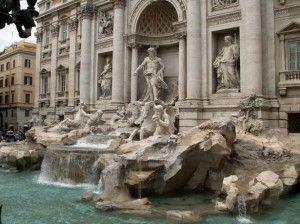Thursday

Ruminations on the Fall of Rome
[I really like Belloc, but his style, though no doubt superb, is out-dated. Here I re-phrase a few pages from Chapter II of Europe and the Faith.]
In order to understand how the Catholic Church viewed itself, we first need to eliminate the word "Christianity." It connotes an opinion or theory, a point of view or idea. The Christians of this time had no such conception.
On the contrary, they were attached to its antithesis. They were attached to the conception of a thing: of an organized body instituted for a definite end, disciplined in a definite way, and remarkable for the possession of definite and concrete doctrine. One can talk, in speaking of the first three centuries, of stoic_ism_, or epicurean_ism_, or neoplaton_ism_; but one cannot talk of "Christian_ism_" or "Christ_ism_." Indeed, no one has been so ignorant or unhistorical as to attempt those phrases. But the current phrase "Christianity," used by moderns as identical with the Christian body in the third century, is intellectually the equivalent of "Christianism" or "Christism." And it connotes a grossly unhistorical idea, something historically false, something that never existed.
Let's say, for example, that three friends, all cultured, are sitting around dinner in Carthage in 225. They're talking about the intellectual solutions to man's predicament. One man might profess himself a materialist: no personal god, and morality comes from utilitarian reasons. Another man might mention how he has been profoundly impressed by certain "mysteries," into which he has been initiated through a secret ceremony that symbolize the fate of the soul. He has engaged necromancers and believes that he has actually come in contact with the spiritual world.
The third man, however, says he has been reading intently the literature of the Christians. He admires the founder. He quotes phrases, especially from the Gospels. His friends are moved. He then says, "For my part, I have come to make it a sort of rule to act as this Man Christ would have had me act. He seems to me to have led the most perfect life. The practical maxims that are attached to Christ's name seem to me a sufficient guide to life, and I believe I will follow that guide for the rest of my life."
This third man would not have been considered a Christian. He would have been neither in danger or persecution nor welcomed to participate in the Christians' somewhat secret society. Such an opinion ("Christism") had no relation to the Church. We do not know how far it existed, since it was unimportant, but it would have set squarely with the prevailing intellectual atmosphere of the time: vague opinions and skepticism.
The Christian was not (and is not now) a theory. It was, and is, a thing. It was expressed in an organism, and that organism was the Catholic Church.
There were, of course, heresies, and those involved in the heresies called themselves "Christians," even though they were outside the Church, but heretical sects existed precisely because there was the single Catholic Church, which was marked by exact doctrine, unbroken tradition, and absolute unity.
Heretical sects arose from doctrines that were not fully defined. Men would take one of those doctrines and assert their opinion on it, while others would assert their opinion. After debate and counsel, and the bishops' authoritative statement, one group's opinion would be rejected and the others' made orthodox. Those who rejected the finding became heretics, and the mere fact that they wanted their opinion to win at counsel (and continued to agitate for it after their defeat) shows that the heretics themselves understood the importance of exact doctrine, unbroken tradition, and absolute unity.
